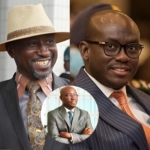
Richard Jakpa, once the third accused in the ambulance procurement trial, has petitioned the Criminal Investigations Department to investigate former Attorney General Godfred Yeboah Dame. His petition alleges that Dame tried to fabricate evidence to implicate Finance Minister Cassiel Ato Forson. The matter raises serious questions about fairness in Ghana’s justice system and whether prosecutions are being handled with integrity.
The ambulance case has been politically sensitive from the start. Forson, then Minority Leader, was accused with Jakpa of causing Ghana to lose over €2.3 million in a contract to procure 200 ambulances. The trial dragged on for years, becoming both a legal contest and a political talking point. A turning point came when an audio recording and WhatsApp messages between Dame and Jakpa were leaked and later admitted into evidence. The content suggested that Dame, as Attorney General, may have been trying to persuade Jakpa to give testimony against Forson.
The High Court admitted the evidence but declined to halt the trial. The presiding judge, Justice Afia Serwaa Asare Botwe, went further by openly cautioning Dame to consider recusing himself. Her concern was that the credibility of the prosecution, and by extension the dignity of the court, might be compromised. That intervention underscored how delicate the situation had become.
The law is clear. Under Ghana’s Criminal Offences Act, anyone who fabricates evidence with the intent to mislead a court is guilty of a felony equivalent to perjury. It is also a crime to prevent a witness from giving truthful evidence. In addition, the Legal Profession Act gives the General Legal Council authority to discipline lawyers who act improperly. If Jakpa’s petition is sustained, Dame could face not only criminal investigation but also professional sanctions.
Commentary around the case has been divided. Kofi Bentil, Vice President of IMANI Africa, has often warned that prosecutions in Ghana can turn into political tools. He has described them as sometimes motivated by vengeance or abuse of power, adding that state institutions can come under pressure even when lawful processes appear to be followed. But if this reasoning is applied now, it must also apply to Dame’s conduct when he was both prosecuting Jakpa and allegedly pressuring him outside the courtroom. Was that not also an abuse of power? Was that not also vengeance? To point out political motivation today but remain silent on Dame’s alleged conduct earlier creates inconsistency. Kofi Bentil must come again, because credibility depends on applying the same standard to all sides.
If the allegations are proven, the implications are serious. Every case Dame handled as Attorney General would come under suspicion. Accused persons could question whether the evidence presented against them was genuine or manipulated. That would damage public trust in the justice system, which already suffers from perceptions of political influence.
For ordinary citizens, the issue is not abstract. Imagine being accused of a crime and facing a prosecutor who feels free to pressure witnesses or adjust evidence. Even if you were innocent, your confidence in getting a fair trial would collapse. That is why Jakpa’s petition is not just about him or Forson. It is about whether Ghanaians can still believe that justice is impartial.
The CID has a duty to investigate thoroughly and transparently. If no wrongdoing is found, the reasons must be made public. If wrongdoing is found, the law must take its course. The General Legal Council also has a role. Too often, complaints against high-profile lawyers do not go far. This case provides an opportunity to show that the rules apply equally to all.
The popular saying that “the law is no respecter of persons” is now being tested. If the CID, the courts, or the General Legal Council shy away, it will confirm the view that the law bends to political power. But if they follow the evidence and act without fear or favour, it will strengthen public confidence that justice in Ghana is not for sale.
The Dame–Jakpa affair is more than a scandal. It shows how prosecutions can become political and how quickly public trust can be lost. Our institutions must confront it openly or risk deepening suspicion. What happens next will reveal whether Ghana’s justice system serves the people or the powerful.